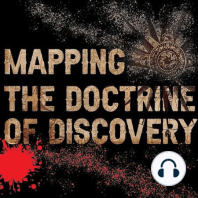62 min listen

S02E01 – The Backstory of Johnson v. M’Intosh with Lindsay Robertson
S02E01 – The Backstory of Johnson v. M’Intosh with Lindsay Robertson
ratings:
Length:
50 minutes
Released:
Jun 26, 2023
Format:
Podcast episode
Description
We begin this episode with a land acknowledgement. Our hosts Prof. Philip P. Arnold and Sandy Bigtree (Mohawk Nation), begin by introducing our guest Lindsay Robertson. He is the Chickasaw Nation Endowed Chair in Native American Law, Faculty Director, the Center for the Study of American Indian Law and Policy, and the Sam K. Viersen Family Foundation Presidential Professor. He is the author of the 2005 book Conquest by Law: How the Discovery of the Americas Dispossessed Indigenous Peoples of Their Lands. The episode begins with Prof. Robertson providing the context for Johnson v. M’Intosh, Chief Justice John Marshall and the Marshall trilogy, which is Johnson v M'Intosh, 21 US (8 Wheat) 543 (1823), Cherokee Nation v Georgia, 30 US (5 Pet) 1 (1831) and Worcester v Georgia, 31 US (6 Pet) 515 (1832). Early in Prof. Robertson’s career, he was looking to do a history, and he knew these three cases so he began looking into them and began wondering what was the history and story behind the cases. As he dug into the archives, he realized that there were significant gaps in the archive. An Archives at the Historical Society of Pennsylvania helped him get into touch with Jasper Brinton, whose ancestor had been secretary of the land companies at the center of the case. It turns out that the family had preserved the documents and had an incredible archive of the materials necessary to write a history of the Johnson decision. The United Illinois and Wabash Land Companies Collection is available online and thanks to Brinton, Robertson, and the librarians at the University of Oklahoma this open-access resource is available for free online. We encourage you to please avail yourself of it as you listen to the episode. Support the showView the transcript and show notes at podcast.doctrineofdiscovery.org. Learn more about the Doctrine of Discovery on our site DoctrineofDiscovery.org.
Released:
Jun 26, 2023
Format:
Podcast episode
Titles in the series (24)
Episode 05: The Doctrine of Discovery in the context of Abya Yala with Tupac Enrique Acosta by Mapping the Doctrine of Discovery